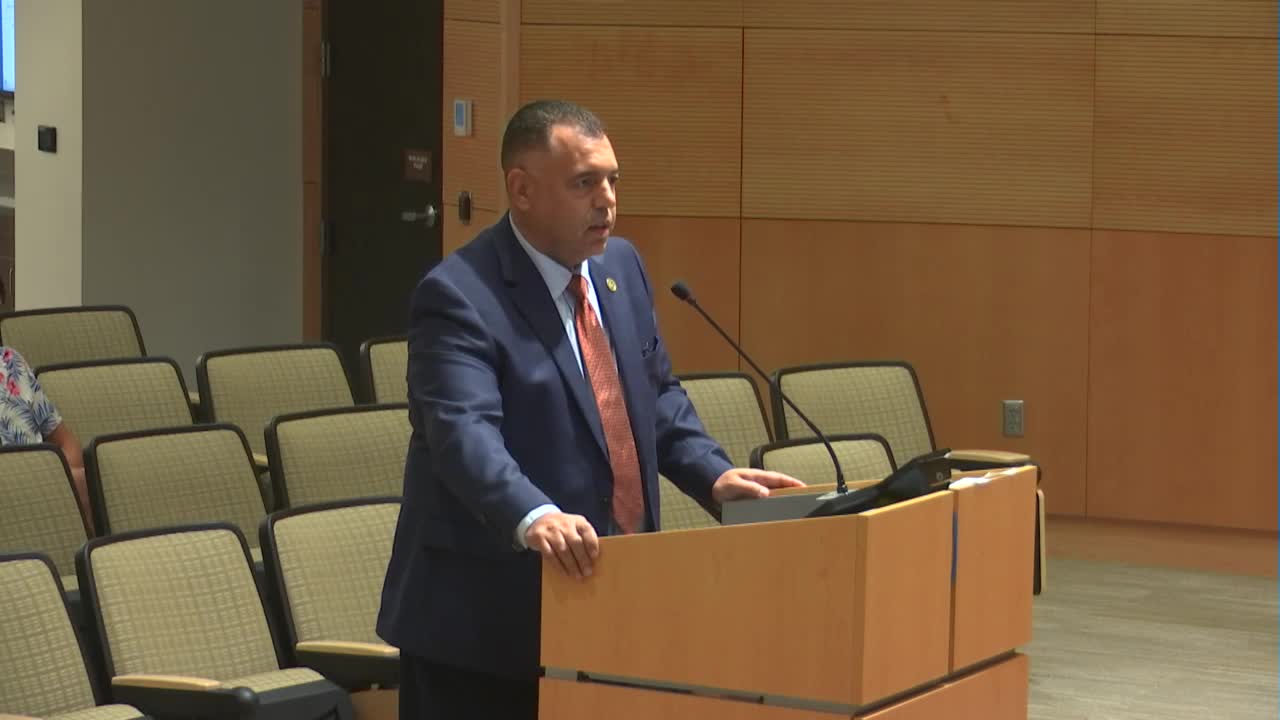Queen Creek adopts special-events ordinance after council debate over amplified sound; vote 4-1
Get AI-powered insights, summaries, and transcripts
Subscribe
Summary
The Queen Creek Town Council on Oct. 15 adopted Ordinance 876-25, creating a town code framework for special-event permitting and enforcement that applies to public and private property.
The Queen Creek Town Council on Oct. 15 adopted Ordinance 876-25, which adds Chapter 19 to the town code to establish a special-events permitting framework and amends Chapter 9 (offenses) to provide enforcement mechanisms.
Police Chief Bridal presented the ordinance and told the council the measure responds to a rising number of large, intermittent events the department has had to manage. The proposed code defines a ‘‘special event’’ as an intermittent activity of four or fewer consecutive days that is inconsistent with a property’s permitted land use and that may affect public safety or town operations. The ordinance is written to apply to both public and private property and to address six broad categories that commonly trigger permitting: town property and rights of way, deviation from permitted land use or occupancy, events that overwhelm public-safety resources, events on private property that affect public roadways or access, use of pyrotechnics/ fireworks and events with amplified sound or that require a state liquor license.
The ordinance establishes standard submittal timelines and an administrative review process: 60 days for typical special-event applications (with a mechanism for exceptions), 14 calendar days for block parties and 30 calendar days for tournaments. An interdepartmental review committee will evaluate permit applications and recommend approval, approval with conditions, or denial to the designated permit administrator. Typical permit conditions include traffic-control plans, crowd and sanitation management, fire and medical services, and other measures intended to mitigate public-safety and neighbor impacts.
Enforcement and remedies under the ordinance follow a stepped approach Chief Bridal described: staff will work with organizers and seek voluntary compliance; noncompliance may lead to civil citations and permit revocation; persistent noncompliance that creates a continuing threat to public safety could be elevated to a misdemeanor charge. The ordinance allows the town to recover costs for cleanup, emergency response, security, damage to government property and other town expenses incurred because of an event. Permit denials or revocations may be appealed to the town manager (or designee) within seven days; civil or criminal citations are subject to court processes.
Chief Bridal told council the ordinance is intended to create a consistent, transparent and enforceable framework while enabling events to occur safely. Staff will provide liaisons and guidance materials (FAQs and web resources) to help organizers determine whether a permit is needed and how to apply.
Council discussion focused primarily on the ordinance’s treatment of amplified sound. Chief Bridal and staff said the permitting framework is intended for larger, organized uses of amplified sound — for example, concerts, DJ-driven events or large speaker systems that materially affect the surrounding neighborhood — rather than small backyard gatherings. Chief Bridal said amplified-sound permits would be reviewed with mitigation conditions such as speaker orientation, decibel limits where appropriate, and time restrictions. He also noted the town already enforces a general noise ordinance and investigates ‘‘unreasonable noise’’ complaints.
Councilmember Padilla and others expressed concern that the amplified-sound language is vague and could require residents to seek permits for ordinary neighborhood activities; Padilla pressed for clearer decibel or distance thresholds. Chief Bridal said staff will provide robust guidance, on-call liaisons and examples on the town’s website and that routine backyard events would typically be handled as noise complaints under existing code rather than through the special-events process.
On motions, Councilmember Brown moved to approve Ordinance 876-25 as posted. After discussion and an offer to revisit implementation details, the council voted to adopt the ordinance. The vote was recorded as 4–1 in favor; the transcript does not record individual yes/no votes by name. One councilmember voiced concerns before the vote about amplified-sound language but the ordinance passed. Staff said they will return to the council with implementation materials and a six-month follow-up report on how the permitting process is working.
The ordinance establishes the permitting structure described above; staff also noted that current town processes for parks and recreation rentals and for pyrotechnics/fire-department permits remain separate and in place.
